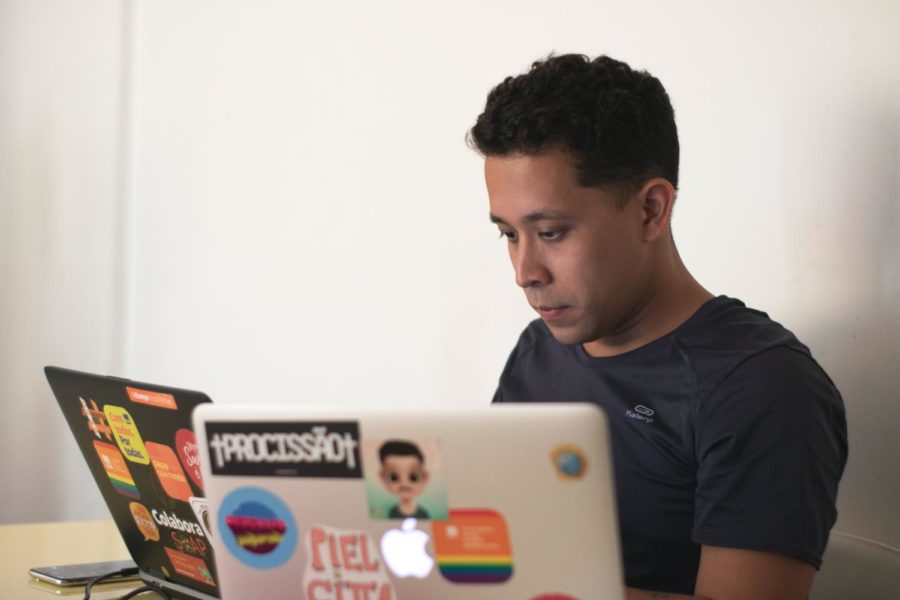Working from home during COVID-19
October 4, 2020
Cassidy Sorenson feels isolated. The only reason she leaves her apartment nowadays is to go to work at the East Side Market inside the Maple-Willow-Larch commons. She picks up extra shifts when possible, but having an all-online schedule makes it hard to build a connection with others.
Working from home creates a certain type of detachment to peers, campus life and the outside world overall.
Sorenson, a sophomore studying computer science, doesn’t feel like she has “busy days” anymore.
“For me, a big part of my social life is literally going to work,” Sorenson said. “So I’m glad I do have a job”
In order to mitigate the spread of COVID-19, Iowa State is hosting classes in a variety of formats, including hybrid, in person or online. The initial outbreak of the pandemic sent students home, forcing them to adapt to working remotely.
For the fall semester, students have the option and flexibility to take their classes virtually wherever they choose. Whether this be from their parents’ basement or from the eighth floor in Willow Hall, having a structured class schedule — or a structured schedule in general — might not be an option for some students.
“I don’t care to have a super set schedule,” Sorenson said. “I just kind of do things when I am motivated.”
Sorenson feels she performs best when she’s attentive, which isn’t always possible when class is scheduled. She feels that through recorded lectures and having the freedom to attend class on her own time, she can do so when she’s attentive and can pay the most attention.
Many students’ daily exercise derives from walking on campus from class to class. However, when classes are taking place 2 feet from your bed, there’s no incentive to get up and walk, unless you’re craving a snack.
Physical and mental health have been determining factors as to how individuals are feeling and performing throughout the pandemic and are directly correlated with one another.
“I go on a walk to the Memorial Union every day, or even farther, just to get lunch,” Sorenson said. “I think it’s so important to go on a walk when you’re supposed to be in your room all the time.”
Walking to get lunch or even going out of your way to schedule walks with friends is an easy way to maintain physical health, and it also helps to take a break from coursework to maintain mental health.
“Mentally, I’d say it’s about the same,” said Connor Cosgrove, junior in hospitality management. “It’s stressful, but for different reasons.”
Cosgrove said he feels he doesn’t have to study as hard with having resources available to him, but instead, he has to work harder to get the information on his own.
“As for physical health, I have noticed that not walking to class everyday, I’ve started to gain a bit of weight,” Cosgrove said.
Sorenson said this semester is “definitely harder” mentally. It’s hard to remain motivated, she said, especially if she’s attending classes when she wants to, and lack of motivation can lead to feeling stuck and getting behind in classes.
Ensuring the physical and mental health of students is a top priority when it comes to online teaching for Evrim Baran, associate professor for the School of Education.
“Their health, their mental well-being were my priorities,” Baran said. “I did a lot of empathy exercises with that as well, trying to understand their unique circumstances with context because each student was facing maybe a different challenge.”
Baran primarily teaches graduate courses at Iowa State, meaning the students who are enrolled in her courses are older than undergraduate students and oftentimes have more responsibilities. In order to fulfill students’ needs, Baran records lectures, which allows students to watch them and learn when the time is right for them.
“I immediately approached them, I asked them to share their situations with me and I was extremely flexible with my courses to fit their needs,” Baran said.
Practicing empathy and allowing room for flexibility is Baran’s main philosophy on teaching and working from home in a fast-paced, always-changing environment that we now call the year 2020.
“I did a lot of restructuring, redesigning of my courses to be more adaptable, more flexible, in terms of deadlines,” Baran said. “Also, at the same time, being structured because in such situations, some people like some sort of structure to manage time well or effectively organize.”
Adapting coursework to fit an online or hybrid format varies from class to class and major to major.
“I’m a computer science major, so naturally, shifting onto that online platform wasn’t bad at all because I’m familiar with it,” Sorenson said. “But for me, primarily, I code. And you can do that online; it’s very straightforward.”
Cosgrove admits to preferring in-person learning, especially with a major of hospitality management.
“I’m definitely doing more work now,” Cosgrove said. “It’s almost like professors assume because we aren’t doing anything, they need to give us more work. Why am I all of a sudden doing twice the work for this one class?”
Building a connection with others and forming a relationship with peers has proved to be difficult during the pandemic when staying home is preferred rather than gathering in public and in large groups.
“We do a lot of group-based work in my courses, and my students told me that these teamwork spaces are really helpful for them to interact with other people, to socialize,” Baran said.







